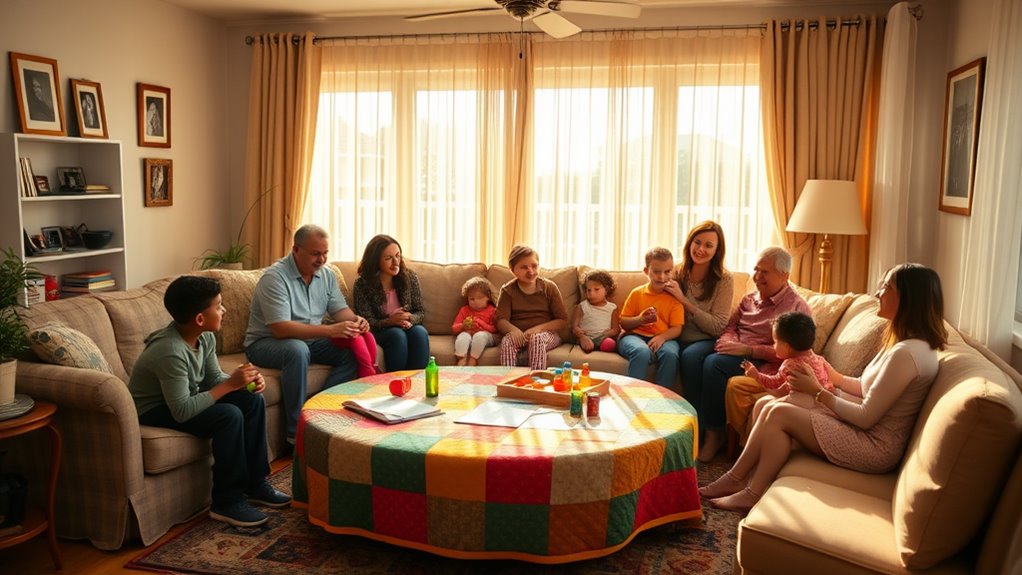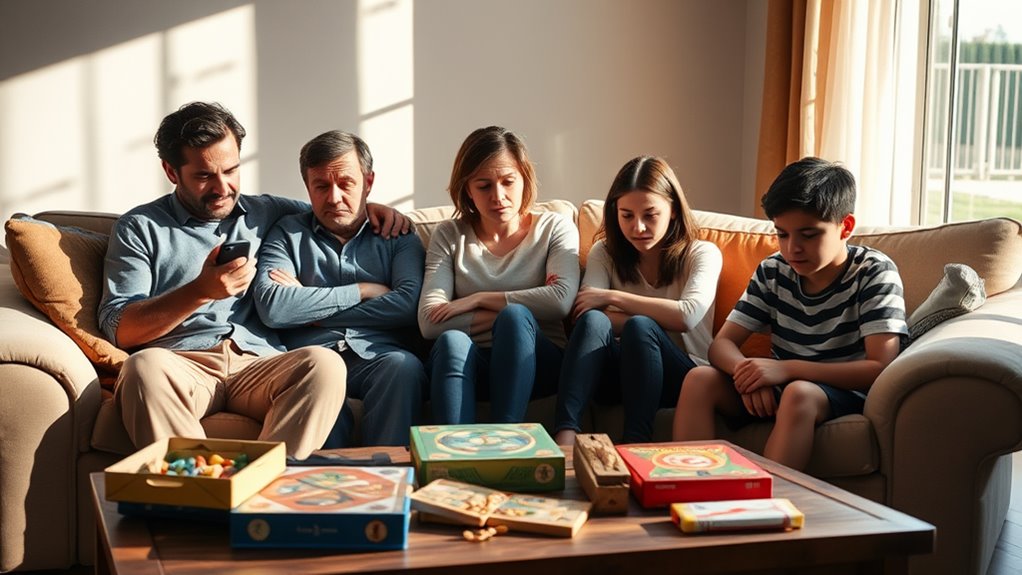Why Family Traditions Are More Than Just Fun
Family traditions are more than just fun; they’re a foundation for strong relationships and shared memories. When you engage in these rituals, you’re nurturing a connected environment that fosters trust and understanding. Traditions also teach important values, helping you pass on morals and ethics to future generations. They encourage open communication, making it easier for everyone to share feelings and thoughts. Additionally, family traditions anchor you during tough times, giving you a sense of stability and resilience. Explore how these elements come together to enrich your family’s experience and strengthen your bonds even further.
Key Takeaways
- Family traditions strengthen emotional connections, fostering trust and understanding among members beyond just enjoyment.
- They serve as a framework for teaching important values, instilling morals through shared practices and experiences.
- Traditions encourage open communication, allowing families to engage in meaningful conversations and express their feelings.
- They help preserve cultural identity, connecting families to their heritage and instilling pride in younger generations.
- Traditions provide stability during challenging times, promoting resilience and adaptability while creating a safe space for coping and growth.
Strengthening Family Bonds
Strengthening family bonds is essential for creating a nurturing environment where everyone feels valued and connected. When you prioritize spending quality time together, you’re building the foundation for lasting relationships. Shared experiences are the cornerstone of this process.
Whether it’s cooking a meal, playing games, or taking a family trip, these moments create memories that foster emotional connections. You mightn’t realize it, but even the simplest activities can have a profound impact.
When you engage in shared experiences, you’re not just having fun; you’re also reinforcing trust and understanding among family members. These interactions provide opportunities to communicate openly and support one another, helping to break down barriers that may exist between you.
Moreover, emotional connections thrive when you share both the highs and lows of life. Celebrating achievements and navigating challenges together can strengthen your ties, making each family member feel important and included.
Creating Lasting Memories
Creating lasting memories is at the heart of family traditions, and these shared experiences help to solidify the connections you’ve been nurturing. Every time you gather for a holiday meal or partake in a fun activity, you’re not just having a good time; you’re engaging in memory preservation. These moments become the fabric of your family’s story, cherished and retold for years to come.
Think about the sights, sounds, and smells you associate with your family gatherings. They serve as nostalgia triggers, instantly transporting you back to those joyful times. Maybe it’s the aroma of your grandmother’s special dish or the laughter echoing from game night. These sensory details make memories vivid and accessible, enriching your family narrative.
When you prioritize creating these moments, you’re building a treasure trove of experiences for future generations. Imagine your children sharing the same stories with their kids, ensuring that your family traditions carry on.
Teaching Important Values
Family traditions play a crucial role in teaching important values that shape who you and your loved ones become. Through shared experiences, you engage in value transmission, ensuring that essential morals and ethics are passed down from one generation to the next.
Whether it’s celebrating holidays, volunteering together, or maintaining family rituals, these practices create opportunities for you to instill moral lessons. When you participate in traditions, you’re not just having fun; you’re reinforcing the principles that guide your family.
For example, a yearly family charity event can teach the value of generosity and compassion, while regular family dinners can emphasize the importance of connection and communication. These moments help your children understand the significance of kindness, respect, and responsibility.
Moreover, traditions provide a framework for discussing complex issues and navigating moral dilemmas. As you share stories from past experiences, you’re imparting wisdom that helps your loved ones make better choices in their own lives.
Ultimately, the values you emphasize through your family traditions can have a lasting impact, guiding future generations in their personal development and fostering a sense of identity and belonging.
Encouraging Communication
Effective communication is vital in any household, and traditions can serve as the perfect backdrop for fostering open dialogue. When you engage in family traditions, whether it’s a weekly game night or a yearly holiday gathering, you create an environment where everyone feels comfortable sharing their thoughts.
These moments allow for active listening, where each family member can express themselves without fear of judgment. During these traditions, encourage everyone to participate in discussions. It’s a great opportunity to ask open-ended questions that promote deeper conversations.
For instance, instead of simply asking how someone’s day was, you might inquire about what made them smile or what challenges they faced. This approach not only strengthens bonds but also helps family members practice active listening, as they’ll need to pay attention to one another’s responses.
Moreover, by making communication a central part of your traditions, you’re teaching younger family members the importance of expressing their feelings and thoughts. This foundation of open dialogue can lead to healthier relationships and a more cohesive family unit.
Embrace these traditions, and watch as your family communication flourishes.
Fostering Cultural Identity
One powerful way to foster cultural identity is through the celebration of traditions that reflect your heritage. When you engage in these practices, whether it’s preparing traditional meals, participating in cultural festivals, or sharing stories passed down through generations, you’re actively connecting with your roots. This connection isn’t just about nostalgia; it plays a vital role in identity formation.
By immersing yourself and your family in these traditions, you create a sense of belonging and pride in your cultural heritage. It’s like a thread that weaves your family’s history into your present, making you more aware of who you are and where you come from. Each celebration or ritual offers a chance to instill values, beliefs, and experiences, reinforcing your family’s unique identity.
Moreover, sharing these customs with younger generations ensures that your cultural heritage remains alive and vibrant. They’ll learn the significance behind each tradition, fostering appreciation and respect.
Building Resilience and Adaptability
Traditions often serve as a foundation for building resilience and adaptability within a family. When you engage in family rituals, you not only strengthen bonds but also develop essential coping skills. Life is unpredictable, and having consistent traditions can provide a sense of stability that helps you navigate challenges.
For instance, regular family game nights or holiday gatherings create a safe space for open communication, allowing everyone to express their feelings. This practice fosters flexible thinking, as you learn to adapt to different situations and perspectives within your family unit.
When faced with obstacles, these traditions remind you of your shared history and values, empowering you to tackle problems together. You’ll find that having a go-to tradition to rely on can ease stress and provide comfort during tough times.
Additionally, traditions help you cultivate a growth mindset, encouraging you to see challenges as opportunities for learning. As you face life’s ups and downs, you’ll discover that these experiences strengthen your resilience.
In the end, family traditions become invaluable tools in promoting adaptability and emotional well-being, equipping you to handle whatever life throws your way.
Frequently Asked Questions
How Can I Start a New Family Tradition?
To start a new family tradition, think about activities everyone enjoys. Involve everyone in the tradition planning process, focusing on family bonding. Whether it’s game night or a monthly dinner, make it meaningful and fun!
What Are Some Unique Family Tradition Ideas?
You might consider creative traditions like a seasonal scavenger hunt or a themed dinner night each month. These unique family activities can bring everyone together and create lasting memories while having fun throughout the year.
How Do Traditions Help During Tough Times?
Traditions serve as essential coping mechanisms during tough times, providing you with emotional support. They create a sense of stability and familiarity, reminding you that you’re not alone and helping to strengthen family bonds when challenges arise.
Can Family Traditions Change Over Time?
Yes, family traditions can change over time. Tradition evolution often reflects cultural influences, adapting to new generations’ values and experiences. Embracing these changes can strengthen bonds, keeping your family’s identity vibrant and relevant.
What if Family Members Disagree on Traditions?
If family members disagree on traditions, it’s essential to communicate openly. Tradition compromise can help blend different perspectives, especially when cultural differences arise. Finding a middle ground can strengthen bonds and create new shared experiences.





